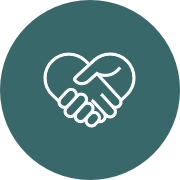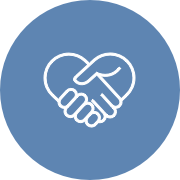
RHD’s COSP helps families heal together
Published on December 4, 2017
Kim walked into a classroom and saw her daughter, Angel, sitting quietly in a chair, engaging in activities alongside other children at RHD’s Children’s Outreach Services Program. This simple act, achieved with intensive support from COSP staff, was so dramatic that Kim was moved to tears.
“I cried tears of joy,” Kim said. “That was something she was never able to do. I actually cried tears of joy because I never thought that would happen.”
Angel was diagnosed with Cri-du-chat syndrome, a rare genetic chromosomal condition characterized by cognitive, speech and motor delays, hyperactivity and aggression, as well as poor growth development. Angel is nine years old, and Kim said her condition was placing a toll on the family — and that COSP had made a tremendous difference.
“It was very difficult trying to figure out what to do,” Kim said. “Angel’s behavioral issues made things so hectic for our family. Angel had a lot of head banging. She was doing a lot of kicking, hair-pulling and spitting. We were just trying to love her and get past the denial, hurt and pain.”
When Angel’s family found COSP, things turned around. Angel has been working with a team led by Behavioral Specialist Consultant Gbolo Kowou and Therapeutic Staff Support Crystal Bachan-Swain.
“Angel was unable to effectively communicate when she first started with us,” said COSP Project Director Chevaughn Satchell. “Since then, Gbolo and the team have introduced sign language with her. They’ve helped her eliminate eloping and Angel can withstand being in social situations. Her mom is also more aware of Angel’s triggers and how to address them. I’m proud of the progress Angel has made thanks to the hard work of the COSP team, especially Crystal and Gbolo.”
Angel’s story is an example of how the right support can make a huge difference for families of children with behavioral health needs. At RHD’s Children’s Services, thousands of families have found the support they needed through RHD’s unique, effective children’s programs. RHD has a diverse continuum of services, with a solid network of resources and the ability to provide different services based on the needs of different populations. COSP provides intensive community-based services to children and adolescents (birth to age 21) who are emotionally or developmentally challenged.
Service needs and treatment recommendations are based on team decisions to ensure that all clinical, educational, and social issues are identified. Master’s Level and Bachelor’s Level Professionals provide intensive support to children and adolescents with psychological, behavioral, and emotional needs in the home, school, and community.
COSP’s multi-disciplinary approach to mental and behavioral health services includes psychological evaluations, case management, behavioral specialist consultations, mobile therapy and therapeutic staff support. Services are delivered to clients in a comprehensive way — after an initial psychological evaluation to assess the child’s mental and behavioral health needs, treatment recommendations are determined. The case manager then develops and implements a service coordination plan.
The service plan is implemented by a mobile therapist who works with children and their families in a range of settings, and by a behavioral consultant who provides clinical direction and planning. The behavioral consultant also monitors the child’s progress, assesses the success of interventions, and if needed, modifies the child’s treatment plan. Finally, the therapeutic staff support person provides behavioral reinforcement and emotional support, along with time-structuring activities.
In every program in RHD’s Children’s Services, a premium is placed on parent involvement. RHD believes that when a child is in crisis, the family is in crisis. Many RHD programs have parent workshops that teach how to de-escalate, and self-soothe. RHD’s approach is to move the children and their families from crisis together.
“We work to make sure families are aware of the service through ongoing meetings so that when a need arises, they are already familiar with the program,” RHD regional director Sebrina Harrison said. “We want families to be part of the process from the start.”
COSP currently supports 250 families, including Kim and Gregory, whose daughter Angel has been a long-time participant in the program. COSP participants are re-evaluated every six months to determine what kind of ongoing care they need, if any. As with most clients, the goal for Angel is to slowly transition out of the program, allowing her and her parents to use the skills they’ve been taught.
“I think about just having her walk beside me like any other child out there,” said Kim, talking about her future hopes for Angel. “It’s going to take a little work, but I believe it can happen.”



